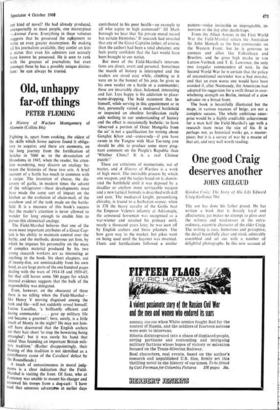Old, unhappy far-off things
PETER FLEMING
A History of Warfare Montgomery of Alamein (Collins 84s) Fighting is, apart from cooking, the oldest of the skills which homo sapiens found it obliga- tory to acquire; and there are moments, on the long journey from the fortification of Jericho in 7000 ac to the devastation of Hiroshima in 1945, when the reader, his atten- tion wandering, may discern an analogy be- tween the histories of these two arts. A brief account of a battle has much in common with a recipe. The invention of cheese, the dis- covery of garlic, in modern times the advent of the refrigerator—these developments must have made the same sort of impact on the kitchen as the evolution of chain-mail, of the crossbow and of the tank made on the battle- field. It is a measure of this book's success that the reader's attention is never allowed to wander for long enough to enable him to pursue this chimerical analogy.
The Field-Marshal believes that one of the seven most important attributes of a Great Cap- tain is his ability to maintain control over the battle; and the methods, dexterous yet firm, by which he imposes his personality on the mass of complex material produced by his two young research workers are as interesting as anything in the book. Six short chapters, out of twenty-five, are unmistakably from his own hand, as are large parts of the one hundred pages dealing with the wars of 1914-18 and 1939-45; but that still leaves some 500 pages for which internal evidence suggests that the bulk of the responsibility was delegated.
Even, however, on the obscurest of these there is no telling when the Field-Marshal- like Henry V moving disguised among the rank and file—will not suddenly reveal himself. Lucius Lucullus, 'a brilliantly efficient and daring commander . . . gave up military life and became a gourmet'; here, surely, is a little touch of Monty in the night? He may not him- self have discovered that the English archers cut their hair short 'to stop the bowstring being entangled'; but it was surely his hand that added 'thus founding an important British mili- tary tradition.' (Rather disappointingly, their flouting of this tradition is not identified as a contributory cause of the Cavaliers' defeat by the Roundheads.) A touch of censoriousness in moral judg- ments is a clear indication that the Field- Marshal is visiting the front. Of Saxe, who at Fontenoy was unable to mount his charger and reviewed his troops from a dog-cast: 'I have read that amorous adventuPes in earlier days
contributed to his poor health—an example to all who aspire to high command!' Of Marl- borough we hear that 'his private moral record has certain blemishes.' If research had revealed that any of the Great Captains (other, of course, than the author) had been a total abstainer, one feels pretty confident that the fact would have been brought to our notice.
But most of the Field-Marshal's interven- tions are direct, overt and personal. Sometimes the march of history is interrupted and the readers are stood easy while, climbing as it were on to the bonnet of his jeep, he gives us his own verdict on a battle or a commander; these are invariably clear, balanced, interesting and fair. Less happy is his addiction to place- name-dropping. The bald statement that he himself, while serving in this appointment or in that, personally visited a mediaeval battlefield or inspected an obsolete fortification really adds nothing to our understanding of history and the effect is occasionally bathetic; to have 'observed a portion of Outer Mongolia from the air' is not a qualification for writing about Genghiz Khan and—conversely—if you have swum in the Yangtse with Mao Tse-tung you should be able to produce some more preg- nant comment on the People's Republic than 'Whither China? It is a real Chinese puzzle!'
These are criticisms of mannerisms, not of matter, and A History of Warfare is a work of high merit. The inevitable process by which one weapon, and the tactics based on it, domin- ated the battlefield until it was deposed by a deadlier or anyhow more serviceable weapon and a new tactical formula is described with skill and care. The mediaeval knight, personifying chivalry, is traced to a barbarian source; when in 378 the heavy cavalry of the Goths beat the Emperor Valens's infantry at Adrianople, the armoured horseman was recognised as a war-winner and retained his primacy until, nearly a thousand years later, he was seen off by English archers and Swiss pikemen. The bow gave way to the musket, but pikes went on being used until the bayonet was invented. Fleets and fortifications followed a similar pattern—today invincible or impregnable, to- morrow or the day after death-traps.
From the Allied Armies in the First World War the Field-Marshal selects the Australian Sir John Monash as the best commander on the Western Front; but he is generous to enemies and allies like Falkenhayn and Brusilov, and he gives high marks to von Luttow-Vorbeck and T. E. Lawrence, the only two irregular commanders of note. In the Second World War he is certain that the policy of unconditional surrender was a bad mistake, and that an even worse one would have been avoided if, after Normandy, the Americans had adopted his suggestion for a swift thrust-in over- whelming strength on Berlin, instead of a slow advance on a broad front.
The book is beautifully illustrated but the maps, in various nuances of beige, are not a complete success. The whole ambitious enter- prise would be a highly creditable achievement for a man half the Field-Marshal's age with a research team twice the size of his. It is perhaps not, as historical works go, a master- piece; but it is a survey of war by a master of that art, and very well worth reading.






































 Previous page
Previous page